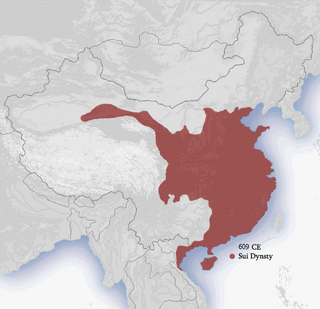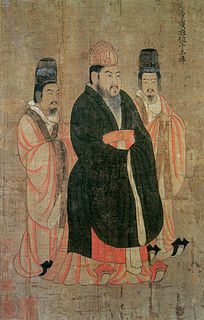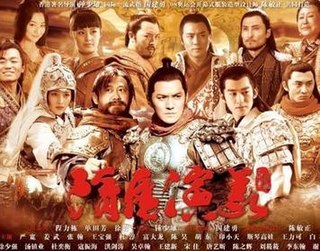
The Sui dynasty was a short-lived imperial dynasty of China of pivotal significance. The Sui unified the Northern and Southern dynasties and reinstalled the rule of ethnic Chinese in the entirety of China proper, along with sinicization of former nomadic ethnic minorities within its territory. It was succeeded by the Tang dynasty, which largely inherited its foundation.

Emperor Wen of Sui, personal name Yang Jian (楊堅), Xianbei name Puliuru Jian (普六茹堅), nickname Nryana, was the founder and first emperor of China's Sui Dynasty. He was a hard-working administrator and a micromanager. The Sui Shu records him as having withdrawn his favour from the Confucians, giving it to "the group advocating Xing-Ming and authoritarian government." As a Buddhist, he encouraged the spread of Buddhism through the state. He is regarded as one of the most important emperors in Chinese history, reunifying China in 589 after centuries of division since the fall of Western Jin Dynasty in 316. During his reign, the construction of the Grand Canal began.

Emperor Yang of Sui, personal name Yang Guang (楊廣), alternative name Ying (英), nickname Amo (阿摩), Sui Yang Di or Yang Di (炀帝) known as Emperor Ming (明帝) during the brief reign of his grandson Yang Tong), was the second son of Emperor Wen of Sui, and the second emperor of China's Sui dynasty.

Yang is the transcription of a Chinese family name. It is the sixth most common surname in Mainland China.
The Battle of Salsu was a major battle that occurred in the year 612 during the second campaign of the Goguryeo–Sui War between Goguryeo of Korea and Sui of China. Goguryeo won an overwhelming victory over the numerically superior Sui forces at Salsu River.
The Goguryeo–Sui War were a series of invasions launched by the Sui dynasty of China against Goguryeo, one of the Three Kingdoms of Korea, between AD 598 and AD 614. It resulted in the defeat of the Sui and was one of the pivotal factors in the collapse of the dynasty, which led to its overthrow by the Tang dynasty in AD 618.
Dugu Qieluo or Dugu Jialuo, formally Empress Wenxian (文獻皇后), was an empress of the Chinese Sui dynasty. She was the wife of Emperor Wen, who, on account of his love and respect for her, as well as an oath they made while they were young, did not have any concubines for at least most of their marriage, an extreme rarity among Chinese emperors. She also bore him all his 10 children. She was powerful and influential during her husband's reign, and she was heavily involved in his decision to divert the order of succession from their oldest son Yang Yong to the second son Yang Guang.
Yang Liang (楊諒) -- courtesy name Dezhang (德章), alternative name Jie (傑), nickname Yiqian (益錢) -- was an imperial prince of the Chinese dynasty Sui Dynasty. He was a son of Emperor Wen and his wife Empress Dugu, who, during his father's reign, controlled the region north of the Yellow River. After his father's death in 604, he rose against his brother Emperor Yang, but was soon defeated by Emperor Yang's general Yang Su and forced to surrender. He was reduced to commoner rank and imprisoned for the rest of his life.
Empress Xiao, formally Empress Min, was an empress of the Chinese Sui Dynasty. Her husband was Emperor Yang of Sui.
Yuwen Shu, courtesy name Botong (伯通), formally Duke Gong of Xu (許恭公), was an official and general of the Chinese dynasty Sui Dynasty. He was a confidant of Emperor Yang and was instrumental in Yang Guang's displacement of his brother Yang Yong as crown prince; therefore, after Yang Guang became emperor, Yuwen Shu became exceedingly powerful and was one of two generals who spearheaded Yangdi's efforts in the Goguryeo-Sui Wars. His son Yuwen Huaji later led a coup against Emperor Yang in 618 and, after killing Emperor Yang, briefly claimed imperial title in 619, but was soon captured and killed. Another son of Yuwen Shu, Yuwen Shiji, however, was a friend of Tang Dynasty's founder Li Yuan, and after Li Yuan established Tang remained an influential official.
Yuwen Huaji was a general of the Chinese Sui Dynasty who, in 618, led a coup against Emperor Yang of Sui, killing him. He subsequently declared Emperor Yang's nephew Yang Hao emperor and led Emperor Yang's elite Xiaoguo Army (驍果) north, but was then repeatedly defeated by Li Mi, Li Shentong (李神通), and finally Dou Jiande. Believing that his defeat was near and wanting to be emperor before his ultimate defeat, he poisoned Yang Hao and declared himself the emperor of a Xu state. Dou captured him in 619 and killed him.
Yao Silian, courtesy name Jianzhi (簡之), formally Baron Kang of Fengcheng (豐成康男), was an official of the Chinese dynasties Sui Dynasty and Tang Dynasty and was the lead author of the Book of Liang and Book of Chen, official histories of Liang Dynasty and Chen Dynasty, which his father Yao Cha (姚察), a Chen official, had begun but did not finish.
Dugu (獨孤) was a Chinese compound surname of Xianbei/Xiongnu origin. There is still very few, in single digits, Chinese people with the surname today, mainly reside in Shanghai. There is a small Korean population with this surname in North Korea, mainly in Ryongchon County and Uiju County near the Chinese border.
Prince or King of Yan was a Chinese feudal title referring to the ancient Chinese State of Yan and to fiefs including its former capital of Yanjing.

Heroes in Sui and Tang Dynasties is a Chinese television series based on Chu Renhuo's historical novel Sui Tang Yanyi, which romanticises the historical events leading to the fall of the Sui dynasty and the rise of the Tang dynasty. The series was first broadcast in mainland China on various television networks on 14 January 2013. It is not to be confused with Heroes of Sui and Tang Dynasties 1 & 2, a similar television series also based on the novel, but was released earlier in December 2012. Filming for the series started on 5 November 2011 at the Hengdian World Studios and wrapped up in May 2012.

The Three Sui Quash the Demons' Revolt (三遂平妖傳) is a Chinese novel attributed to the 14th-century novelist Luo Guanzhong, although the earliest extant version was compiled between 1571 and 1589, possibly by Wang Shenxiu (王慎脩). In 1620, Feng Menglong expanded the novel to forty chapters from the original twenty. A work in the shenmo genre, the novel blends comedy with the supernatural, and is an early work of vernacular fiction.
Heroes of Sui and Tang Dynasties 1 & 2 is a 2012 Chinese historical television series directed by Li Hantao. It was first aired on Hunan Television in China in 2012. The series is based on the events in the reign of Emperor Yang of Sui during the Sui Dynasty and Tang Dynasty. The series stars Dicky Cheung, Winston Chao, Liu Xiaoqing, Yu Shaoqun, Wezei, Kou Hsi-Shun, Yoki Sun, Jang Seo-hee, and Lan Yan. It is followed by the sequel Heroes of Sui and Tang Dynasties 3 & 4.

Yong Province or Yongzhou was the name of various regions and provinces in ancient China, usually around the Wei River or the imperial capital.







